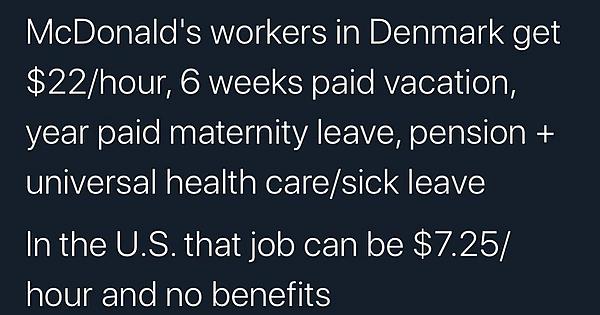I'm citing the NYTimes because you're a Lib and you're supposed to pass this along to your Lib-ass friends.
https://www.nytimes.com/2020/05/08/opinion/sunday/us-denmark-economy.html
Starting pay for the humblest burger-flipper at McDonald’s in Denmark is about $22 an hour once various pay supplements are included. The McDonald’s workers in Denmark get six weeks of paid vacation a year, life insurance, a year’s paid maternity leave and a pension plan. And like all Danes, they enjoy universal medical insurance and paid sick leave. One reason Denmark was more effective than the United States in responding to the crisis is that no Dane hesitated to seek treatment because of concerns about medical bills.
Abu Sayeed knew that Americans working in fast food don’t do so well. “I heard about the movement,” he said, trying to remember its name. “Fight for something. Fight for $20? What was it?” “Fight for $15,” I explained. “They want $15 an hour. There was an awkward silence. He nodded sympathetically. Then he tried not to sound condescending. “I feel for them,” he said earnestly of American workers at McDonald’s.”
Danes pay an extra 19 cents of every dollar in taxes, compared with Americans, but for that they get free health care, free education from kindergarten through college, subsidized high-quality preschool, a very strong social safety net and very low levels of poverty, homelessness, crime and inequality. On average, Danes live two years longer than Americans.
A Big Mac flipped by $22-an-hour workers isn’t even that much more expensive than an American one. Big Mac prices vary by outlet, but my spot pricing suggested that one might cost about 27 cents more on average in Denmark than in the United States. That 27 cents is the price of dignity.
Americans assume that Danish wages must be high because of regulations, but Denmark has no national minimum wage, and it would be perfectly legal for a construction company or a corner pizzeria to hire workers at $5 an hour. Yet that doesn’t happen. The typical bottom market wage seems to be about $15 — about twice the federal minimum wage in the United States, a country with a roughly similar standard of living. Why is that?
One reason is Denmark’s strong unions. More than 80 percent of Danish employees work under collective bargaining contracts, although strikes are rare. There is also “sectoral bargaining,” in which contracts are negotiated across an entire business sector — so in Denmark, McDonald’s and Burger King pay exactly the same — something that Joe Biden suggests the United States consider as well.
Yet there’s another, more important reason for high wages in Denmark.
“Workers are more productive” in Denmark, Lawrence Katz, a labor economist at Harvard, noted bluntly. “They have had access to more and higher-quality human capital investment opportunities starting at birth.”
In contrast, after half a century of underinvestment in the United States, many 20th-percentile American workers haven’t graduated from high school, can’t read well, aren’t very numerate, struggle with drugs or alcohol, or have impairments that reduce productivity. Increasingly, I came to see that emulating a Danish-style system of high wages wasn’t just about lifting the minimum wage but, even more, about investing in children.


Stop violating premise #1:
Yeah we did this with $15 an hour and $10 before that. I think it’s the wrong way to frame things because it doesn’t actually lead anywhere. Just people making enough so they can shut up the libs. Talk to most libs and they’ll agree on whatever pay raise. I was making this exact amount and still had to live in a shared apartment in a rent controlled property. It does nothing to help us recoup the wealth we deserve and your better off telling your lib friends they should own the company where they’re working because it’s their labor allowing the company to run in the first place.
deleted by creator
That still is not leading us to our goal of collective ownership. Denmark has more unions. So we could start with advocating for more unions. And use this as an example of how your wage becomes more likely to increase once you have a solid union, but even the unions in the states are often corporatists who create awful deals for workers and then say “well at least you have health insurance.” Min wage may still be a better idea in the immediate. And advocate for these workers to occupy their workspace until they get more concessions.
deleted by creator
I agree that’s why I was saying in the immediate. Long term it would be better to have strong unions. But if I’m going to choose milque toast unions vs. min wage. Right now I’m choosing min wage. I could see where one would disagree with that take.